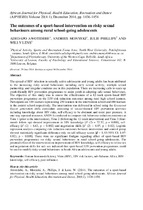| dc.contributor.author | Awotidebe, Adedapo | |
| dc.contributor.author | Monyeki, Andries | |
| dc.contributor.author | Phillips, Julie | |
| dc.contributor.author | Lens, Willy | |
| dc.date.accessioned | 2017-05-05T07:50:00Z | |
| dc.date.available | 2017-05-05T07:50:00Z | |
| dc.date.issued | 2014 | |
| dc.identifier.citation | Awotidebe, A. et al. (2014). The outcomes of a sport-based intervention on risky sexual behaviours among rural school-going adolescents. African Journal of Physical Education, Health, Recreation & Dance, 20: 1436-1454. | en_US |
| dc.identifier.issn | 1117-4315 | |
| dc.identifier.uri | http://hdl.handle.net/10566/2798 | |
| dc.identifier.uri | http://hdl.handle.net/10520/EJC166094 | |
| dc.description.abstract | The spread of HIV infection in sexually active adolescents and young adults has been attributed to the increasing risky sexual behaviours including early sexual activity, multiple sexual partnership, and irregular condoms use in this population. There are increasing calls to scale up youth-friendly HIV prevention programmes to assist youth in adopting safe sexual behaviours. The objective of this study was to assess the effectiveness of a 12-week sports-based HIV prevention programme on the HIV-risk reduction outcomes among rural high school learners. Participants are 430 learners representing 250 learners in the intervention school and 180 learners in the control school respectively. The intervention was delivered in school using the Grassroot Soccer generation skills curriculum consisting of soccer-themed HIV prevention activities including knowledge about HIV risks, self-efficacy to be abstinent and resist peer pressure. A one-way repeated measures ANOVA conducted to compare risk behaviour reduction outcomes at Time 1 (prior to the intervention), Time 2 (following the 12-week intervention) and Time 3 (four-month follow up) showed improvement in HIV knowledge [F (2) = 72.57, p = 0.000], self-efficacy [F (2) = 6.63, p = 0.002] and negotiation skills [F (2) = 4.07, p = 0.02]. Logistic regression analysis comparing risk reduction outcomes between intervention and control group showed statistically significant difference only on self-efficacy scores [β = 1.43 (95% CI: 1.07-1.92); p = 0.018]. There were no significant findigns regarding effect of sport-based HIV prevention programmes on risky sexual behaviours in rural school-going adolescents. The potential effect of the intervention on improvement of HIV knowledge, self-efficacy to refuse sex and negotiation skills for safe sex indicated that sport-based HIV prevention programmes could be used to modify risky sexual behaviours in South African adolescents and young adults. | en_US |
| dc.language.iso | en | en_US |
| dc.publisher | AFAHPER-SD | en_US |
| dc.rights | Publisher retains copyright. Authors may archive the published version in their institutional repository. | |
| dc.subject | Human Immunodeficiency Virus (HIV) | en_US |
| dc.subject | Risk factors | en_US |
| dc.subject | Sub-Saharan Africa | en_US |
| dc.subject | Knowledge | en_US |
| dc.subject | Self-efficacy | en_US |
| dc.subject | Peer influence | en_US |
| dc.title | The outcomes of a sport-based intervention on risky sexual behaviours among rural school-going adolescents | en_US |
| dc.type | Article | en_US |
| dc.privacy.showsubmitter | FALSE | |
| dc.status.ispeerreviewed | TRUE | |
| dc.description.accreditation | DHET | |

